Blue Fear – navigating ecological, social and existential anxieties during the Anthropocene – Amsterdam, 27-30 June 2023.
„Oceans have always imbued seafarers with fear: fear of storms, pirates and shipwreck, and fear of the creatures that live beneath the surface. This conference suggests that such anxieties are currently broadening and intensifying. Not only are people afraid of occasional tsunamis and hurricanes that take lives and ravage coastal habitats. We are also afraid of what we have ourselves unleashed: the realities of sea level rise, climate change, pollution, overfishing and biodiversity loss. Scientists are working overtime to fine-tune the understanding of causes and effects and to provide possible solutions. International policy fora – such as those involved in the current Ocean Decade – are prodding policymakers and politicians to initiate meaningful mitigatory and adaptive action.
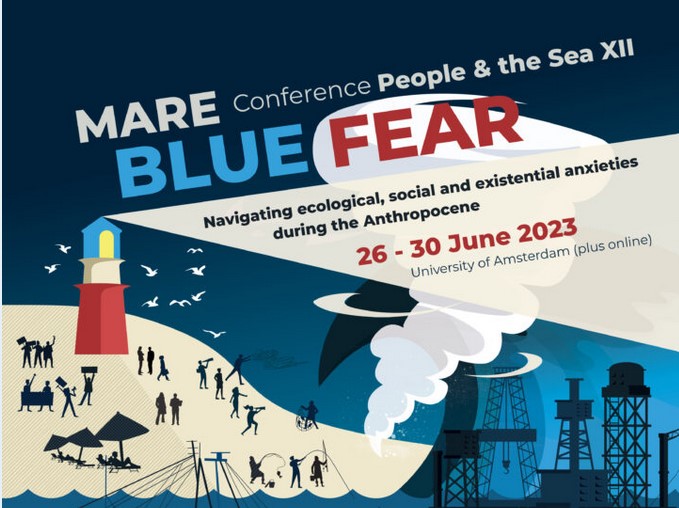
But Blue Fear is affecting the lives of coastal and island habitants all over the world, the people whose livelihoods and identities are intertwined with the coast and the sea for centuries. … The human face of the coast is changing rapidly. New industries are materializing and claiming space: tourism, aquaculture, ocean energy, marine biotechnology, and mineral exploration, amongst others. New ‘belt and road’ initiatives are gaining shape and maritime boundaries are being disputed. Governments all over the world are re-zoning the coast … Security concerns are resulting in the militarization of coastal regions with new and old forms of strife. All these demands for the use of coastal/marine space and resources are creating conflict and posing challenges.
Blue Fear impacts how society views, studies, discusses, and governs the ocean. … it also opens opportunities for invention and transformation: new patterns of livelihood, new technologies, new forms of collaboration, new legal arrangements. New hopes and motivation to engage, connect, and mobilize. … Where does it take us? …“ these are excerpts from the invitation to the conference. The seven parallel streams offered ample opportunities to present case material and reflect together about the bigger picture.
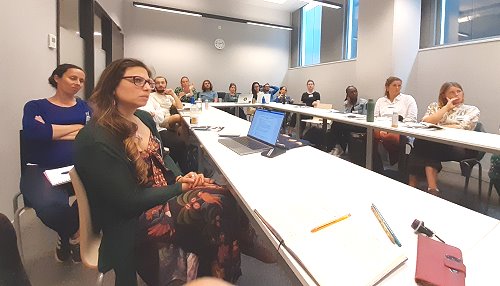
This short piece provides some impressions from few selected sections with emphasis on the panels (60 and 67) focused on Blue Fear in the context of small-scale fisheries chaired by Cornelia Nauen from Mundus maris. The two panels provided room for the presentation and analysis of very different situations in Latin America, Europe, Africa and Asia.
On behalf of a transdisciplinary team from Mexico and Chile Victor Manuel Velázquez Durán of the National Autonomous University of Mexico (UNAM) presented a comparison of governance challenges of fishers in two border regions between Mexico/Guatemala and Chile/Peru. Artisanal operators struggle to be heard in hierarchically structured management arrangements and in the reform process of the fisheries law in Chile. The authors argue in favour of transboundary cooperation for managing straddling resources often subject to industrial overexploitation. Dialogue formats are suggested in order to counter divisive trends associated with securisation and emphasis on borders be they national or of protected areas.
Cornelia’s own paper was titled ‚Master fears and innovate! Artisanal fishers as guardians of the coastal environment in Tuscany, Italy.“ She noted that the policy preference for industrial fisheries in Europe contrasts with the cultural values of artisanal activities, often high value of landings, and potential role in recovering overfished resources. The decade-long struggle off the Tuscany coast, Italy, intends to enforce the legal prohibition of destructive bottom trawling in the three mile coastal strip reserved for artisanal fishing with static gear.
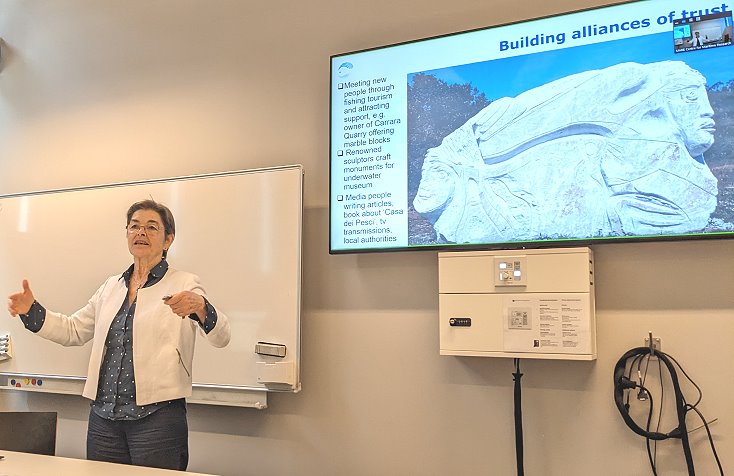
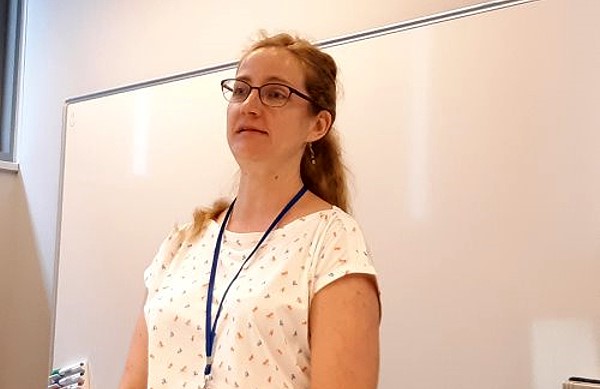
The approach adopted by local fishers and their supporters involves sinking marble sculptures to discourage trawling. An indication of positive effects is the return of turtles and dolphins. These measures are complemented by a diversification of income streams through taking tourists on board. Their exposure to the work of coastal fishing is often an eye-opening experience for urbanised people and builds social support for marine protection. In addition, tasting freshly caught fish has potential to recreate demand for local quality products. It is hypothesized that the future of artisanal fisheries in Europe needs rethinking its different functions so as to renew maritime cultures into a cultural, ecological and socio-economic revival of coastal zones.
That can become the foundation of new attitudes about what we appreciate as societies to determine the direction of change. Such change requires drawing a diversity of stakeholders into respectful dialogue and action. This is expected to be effective in combination with greater collective engagement with coastal governance in relation to climate change mitigation, halting biodiversity loss and reducing social injustices. It recreates capacity for consensus building and robust locally adapted solutions perceived as legitimate and fair and advancing Blue Justice. The slides are available here.
Sophia Kochalski from the University of Santiago de Compostela in Spain (to the right) presented research of a consortium investigating whether the extremely low resource levels of cod and herring in the Baltic sea also led to a social regime shift. Interviews suggested a lack of trust and constructive interaction between sector administrations and trawl fishers. Rebuilding dialogue channels was suggested among the possible responses tracing alternative pass ways to the current crisis.
The following panel featured Michael Mensah’s online presentation from Ghana. With his co-author, he analysed how wide-spread voodoo practices and the belief system among coastal populations in Ghana that attributed particularly unexplained ailments or undesirable situations to curses. Curses or threats of curses were shown to serve to subdue crew members into obedience and preventing them from unionising.
Andrea Quirino Steiner (below) from the Federal University of Pernambuco, Brazil, and coworkers elaborated on the Costa dos Corais Environmental Protection Area, the largest marine protected area in the country as a case study. Perhaps counter-intuitively since its establishment in 1997, it facilitated different forms of ocean grabbing through tourism and real estate speculation.
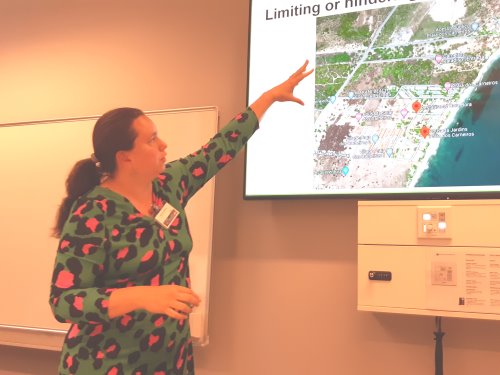
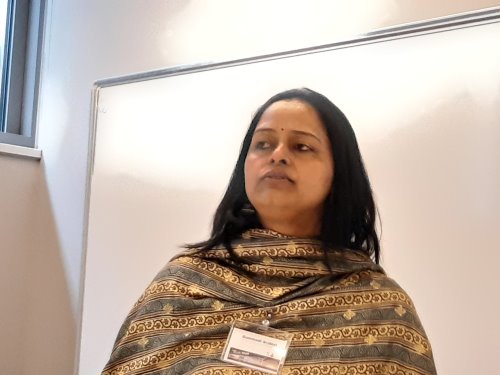
The mechanisms with significant negative effects on artisanal fishers entail, for example, limiting or hindering access to beaches, increasing the cost of living on the coast and promoting undesired professional transitions. But poor waste and sewage management with negative impact on the environment in tourism affected areas also played a role as did poor information of local residents, including fishers, many of whom were unaware of regulations and solutions that might have been used in other regions to similar problems.
Gummadi Sridevi (below) of the School of Economics, University of Hyderabad, India, is working on food and nutrition security. Based on 190 interviews, she analysed the decline of traditional pokkali rice production in alternation or combination with prawn culture in the fields, where water levels could reach 1.8 m. Fewer people now know how to cultivate pokkali and are ready to accept the challenges even though it is often considered of higher nutritional value than other rice varieties. Over the last couple of decades the area of cultivation shrank from 25,000 hectares to only about 4,000 hectares. This way, pokkali became a precious export commodity for a niche market rather than a local staple. A contributing factor is that modern tilling machinery can not be employed on the wet grounds and skilled labour to work manually in the flooded fields have become scarce. So more rice farmers rent their fields only to prawn production with significant effects on the socio-economic and nutritional landscape. Many regret the loss of this culture and nutritional tradition.
In both sessions Cornelia invited all participants to focus on learnings for better futures in the general debates. A few commonalities across the diverse cases arose, in particular, that few opportunities if any, existed for small-scale operators to be properly informed about sector policies, sometimes even locally applicable regulations. It was very difficult for them to be heard and actively participate in any marine spatial planning processes which were happening in many countries and also discussed in several other sessions. Weak social or unionised organisation was a recurrent obstacle to more fairness and Blue Justice. Trust as an essential feature in successful governance seemed to be in short supply.
Can research help to overcome these weaknesses? Supporting more awareness among small-scale operators and drawing attention of political decision-makers and a wider public to good examples of fair access to marine spaces, credit, education and social services has potential for more focus on solutions instead of only describing problematic cases.
There were also clear differences. In Europe, where artisanal fishers are neither economically nor electorally very prominent after decades of industrial modernisation policies arguments for rekindling artisanal fisheries include possibly a context of stronger emphasis on nature restoration and new opportunities for combining an appreciation with cultural heritage with new multifunctionalities in coastal zones. In many countries in the Global South the large populations active and dependent on artisanal fisheries make economic, social and food security arguments in favour of supporting local and regional fish food economies much more pertinent.
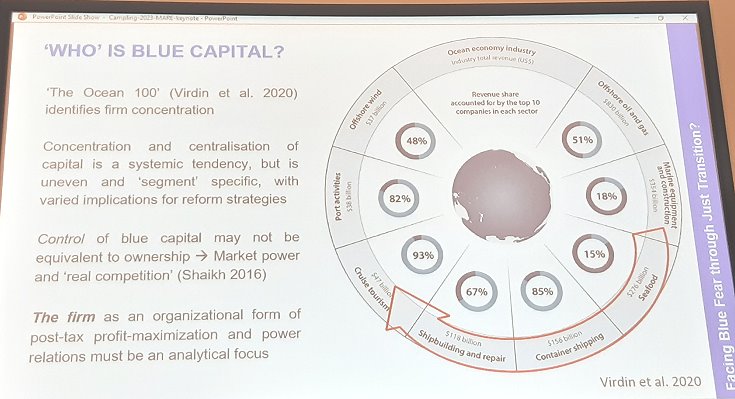
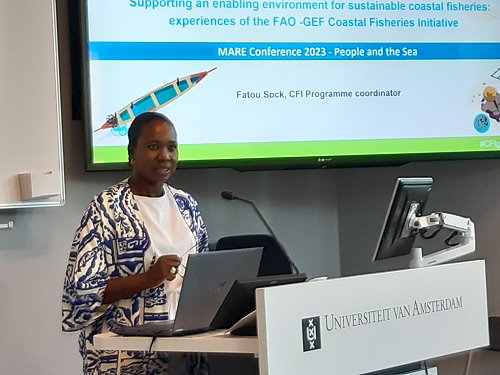
This needs also to be seen in the bigger picture of the development of the Ocean economy as elaborated in a keynote by Liam Campling of the School of Business and Management (QMUL), at the University of London. In his talk „Facing Blue Fear through Just Transition? Redistributing Value(s) and Wealth in the Appropriation of the Global Ocean“ he illustrated the importance of studying important firms and their strategies in order to gain room for manoeuvre in negotiations. While a simplistic dichotomy between large-scale and small-scale would not capture the many forms of interaction, organisation and good intelligence was important for smaller players, be they public or private.
On the closing day of the conference, a session organised by FAO and chaired by Fatou Sock presented interesting insights into challenges and advances of the Coastal Fisheries Initiative supported by the Global Environment Facility to the tune of USD 35 million in three continents, Latin America, Asia and Africa.
The work in Indonesia was particularly noteworthy in that the SASI approach, meaning ’no forbid‘ rooted in ancestral management techniques, has gained new acceptance. Government departments at different levels recognised that they did not have the human, technical and financial resources to cover all management needs and recognised the customary rights governance through including that in the public zoning plan.
The examples from West Africa focused conversely on modernising fisheries legislation and how to improve the recognition of women in Cape Verde’s fisheries through better social services and other gender equity measures.
The contribution from Peru focused on a savings and credit scheme intended to support at least some of the estimated 55,000 fishing households, many of whom had no savings at all and where 86% of the women had compensations well below the minimum wage.
To round off the presentations the Fisheries Performance Assessment Tool (FPAT) was shown to track the triple bottom line of the economic, ecological and community dimensions through a more systematic gathering and analysis of information.
All in all it was an interesting conference that allowed to catch up with more colleagues on-site after the hybrid edition during the pandemic, but that forced many difficult decisions of choosing between the seven parallel sessions. There was much to be learnt from the experiences in a wide spectrum of social systems of marine resource use.
handwerklichen Fischerei Akademie
- Make Fishing Fair in the EU, 25 March 2025
- Beziehungen zwischen Mensch und biologischer Vielfalt über alle Skalen hinweg
- Weltfischereitag, gefeiert am 21. November 2024 in Nigeria
- Mundus maris participated in the 2024 World Fisheries Day organized by Canoe and Fishing Gear Association of Ghana (CaFGOAG).
- Beitrag von Mundus maris zur öffentlichen Anhörung zu UNOC3
- Gipfeltreffen zur Kleinfischerei in Rom, 5.-7. Juli 2024
- Regionales Symposium zur europäischen Kleinfischerei, Larnaca, Zypern, 1.-3. Juli 2024
- Baltic Fisheries Emergency Meeting, Brussels, 26 June 2024
- Ambivalent role of Market and Technology in the Transitions from Vulnerability to Viability: Nexus in Senegal SSF
- Shell fisheries as stewardship for mangroves
- Afrikanische Ausgabe des 4WSFC in Kapstadt, 21. bis 23. November 2022
- World Fisheries Day, 21 November 2023
- Webinar: Herausforderungen und Chancen der Fischerei in Nigeria
- Präsentation der FishBase-App auf dem Symposium in Tervuren
- MARE Conference on Blue Fear – Mundus maris reflects
- The Transition From Vulnerability to Viability Through Illuminating Hidden Harvests, 26 May 2023
- EGU-Veranstaltungen zum Thema Geoethik und gemeinsames Lernen
- Solidarität mit den handwerklichen Fischern in Senegal und Mauretanien
- The legal instruments for the development of sustainable small-scale fisheries governance in Nigeria, 31 March 2023
- Tools for Gender Analysis: Understanding Vulnerability and Empowerment, 17 February 2023
- Community resilience: A framework for non-traditional field research, 27 January 2023
- Sustainability at scale – V2V November webinar
- Europäische Ausgabe des 4WSFC in Malta, 12. bis 14. September 2022
- Beitrag von Mundus maris zum SSF-Gipfel in Rom
- Women fish traders in Yoff and Hann, Senegal, victims or shapers of their destiny?
- Die Akademie setzt ihre Arbeit in Yoff fort
- Illuminating the Hidden Harvest – a snapshot
- Virtual launch event FAO: International Year of Artisanal Fisheries and Aquaculture
- The Small-Scale Fisheries Academy as a source of operational support to PA Guidelines
- Welt-Fischereikongress, Adelaide, 20.-24. September
- Mundus maris unterstützt den Kampf von Paolo, dem Fischer, in der Toskana, Italien
- Catching-up – SSF Academy Yoff, 27 Febr. 2021
- Ausbau der Fähigkeiten der Akteure für eine nachhaltige handwerkliche Fischerei
- Testen von Trainingsmethoden während der Pilotphase der Akademie der handwerklichen Fischerei im Senegal
- Eine Premiere – Einweihung der Akademie der handwerklichen Fischerei in Senegal
